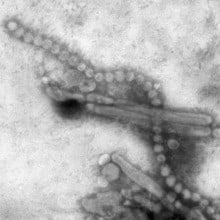Influenza A viruses are responsible for seasonal disease outbreaks in humans. Influenza A also circulates among bird and some mammal populations and periodically crosses between species.
The influenza A H3N2 variant (H3N2v) virus, which circulates in swine, has recently been reported in humans, especially children, and is distinct from other seasonal H3N2 strains found in humans. So far, H3N2v has only been reported in individuals that have had direct contact with pigs and causes a fairly severe disease.
Current vaccines that promote immunity to seasonal human H3N2 strains do not protect against H3N2v. In this issue of JCI Insight, James Crowe of Vanderbilt University and colleagues describe the isolation and characterization of monoclonal antibodies with H3N2v-neutralizing capacity from human subjects given an H3N2v candidate vaccine. While these antibodies effectively neutralized H3N2v, they were not effective against currently circulating human H3N2 strains. However, these antibodies were able to neutralize human H3N2 strains that circulated between 1995 and 2005, indicating that these strains are highly related to H3N2v. Moreover, these results help explain why young children, who have not been exposed to earlier H3N2 strains, are so susceptible to H3N2v infection.
Recognition of influenza H3N2 variant virus by human neutralizing antibodies. James E. Crowe, Jr., Vanderbilt University Medical Center. [email protected] View paper at: http://insight.jci.org/articles/view/86673?key=cd5ec95d2c86e63ad430


